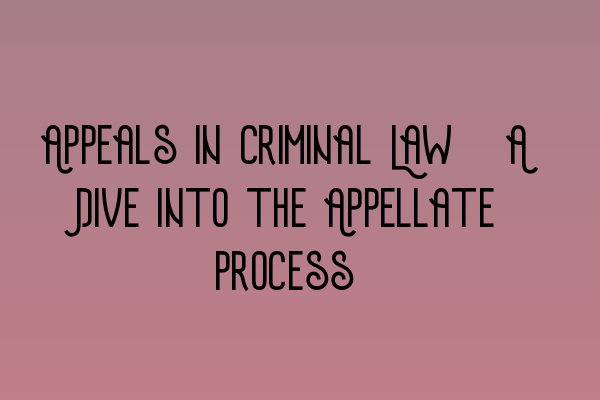Appeals in Criminal Law: A Dive into the Appellate Process
Gaining a comprehensive understanding of the appeals process is crucial for any aspiring criminal lawyer. Appeals, in the context of criminal law, are legal mechanisms that enable a convicted individual or their legal representative to challenge the decision made by a lower court. Whether you are a solicitor, barrister, or studying to become one, having a firm grasp of the appellate process is essential to ensure justice is upheld and protect the rights of your clients.
The Grounds for Appeal
An appeal in criminal law can be sought on various grounds, each related to errors or irregularities in the original trial. Let’s explore some common grounds for appeal:
- Procedural Irregularities: Appeals can be lodged if the trial court did not follow proper legal procedures, such as admitting improper evidence or disregarding substantial evidence that could have influenced the verdict.
- Legal Errors: If the trial judge misinterpreted the law, made incorrect rulings, or gave improper instructions to the jury, there may be grounds for appeal based on legal errors.
- New Evidence: If new evidence comes to light after the trial, which could not have been reasonably discovered during the original proceedings, it may be possible to appeal based on this fresh evidence.
- Prosecutorial Misconduct: Appeals can be made if there is evidence of prosecutorial misconduct, such as withholding crucial evidence, witness tampering, or presenting false evidence. Such misconduct can seriously impact the fairness of the trial.
Understanding these grounds for appeal is vital as it allows you to recognize potential issues in a case and determine if an appeal is a viable option for your client.
The Appellate Process
Once the decision to appeal has been made, the appellate process begins. Let’s break it down into several stages:
- Filing the Notice of Appeal: This is the first step in initiating an appeal. The appellant or their legal representative must file a notice of appeal, outlining the grounds for the appeal and the relief sought.
- Transcript Preparation: The trial record, which includes a verbatim transcript of the trial proceedings, is essential for the appeal process. The appellant must arrange for the preparation of this transcript.
- Preparation of Written Submissions: A comprehensive written submission must be prepared, articulating the legal arguments and grounds for the appeal. This submission is then filed with the appellate court.
- Oral Arguments: Depending on the rules of the appellate court, there may be an opportunity for oral arguments where the appellant’s legal representative presents the case before the panel of judges.
- The Appellate Decision: After careful consideration of the written submissions, oral arguments, and review of the trial record, the appellate court delivers its decision. The court may uphold the conviction, order a retrial, modify the sentence, or even quash the conviction altogether.
It is important to note that the appellate process can be lengthy, with various stages and requirements. As an aspiring criminal lawyer, developing strong research and writing skills is crucial to effectively navigate the appellate process.
Why Appeals Matter
Understanding the importance of appeals in criminal law is vital for legal professionals. Appeals serve several significant purposes:
- Ensuring Justice: The appeals process provides an avenue for correcting errors or miscarriages of justice that may have occurred during the trial. It acts as a safeguard to ensure the fair administration of justice.
- Setting Legal Precedents: Appellate court decisions often set legal precedents that can influence future cases. By engaging in the appeals process, legal professionals contribute to the development of criminal law and ensure consistency in its application.
- Protecting Individual Rights: Appeals give individuals the opportunity to challenge erroneous convictions, protecting their fundamental rights and liberties.
By understanding the importance of appeals, legal professionals can effectively advocate for their clients and work towards a more just legal system.
Conclusion
The appeals process in criminal law holds immense significance. It serves as an essential mechanism to rectify errors, protect individual rights, and contribute to the development of criminal law. As aspiring criminal lawyers, it is imperative to have a deep understanding of the appellate process, including the grounds for appeal and the necessary steps involved. By mastering the appeals process, you can not only advocate for your clients effectively but also contribute to the pursuit of justice in the UK legal system.
For further information and opportunities to enhance your expertise in criminal practice, consider exploring our related articles:
- Workshops and Seminars on Criminal Practice: Expanding Your Expertise
- Updates in UK Criminal Laws: Staying Informed and Prepared
- Mock Tests for SQE Criminal Practice: Exam Simulation for Success
- Enhancing Your SQE Criminal Law Study Group Experience
- Decoding Criminal Evidence Rules: A Detailed Analysis
